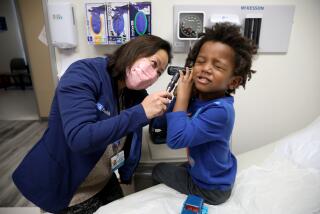Study Finds Latinos to Be Group Most Lacking in Health Coverage
- Share via
Latinos are almost twice as likely as other Californians to be without medical insurance, even though nearly nine out of 10 uninsured Latinos come from families with at least one wage earner, according to a UCLA study released Monday.
While past studies have shown that medical insurance was a major health need for Latinos, the new research provides the most comprehensive look yet at the problem. The study was compiled by the UCLA Center for Health Policy Research under a grant from the Henry J. Kaiser Family Foundation.
The issue of who has and who does not have health insurance is particularly critical in Los Angeles County, which has more uninsured people than any other metropolitan area, ranking last among the 30 largest urban areas in the United States, the researchers said.
Past studies by various health authorities have clearly established that people without health insurance place huge financial and caseload burdens on public hospitals and generally arrive at the hospitals suffering from more acute illnesses because they did not receive preventive care or early intervention.
“This study shows the huge stake Latinos in California have in the national health reform debate,” said Drew E. Altman, president of the Kaiser Family Foundation. “No group stands to benefit more from expanded health insurance.”
A chief finding of the study was that 39% of non-elderly Latinos are completely uninsured, meaning they are not covered either by private insurance or Medi-Cal, compared to 23% of all non-elderly Californians.
The authors of the study said the finding that 87% of uninsured Latinos come from families with at least one wage earner flies in the face of popular notions among Americans that most uninsured are unemployed.
“There is a common misconception that the uninsured are unemployed,” said Gerald F. Kominski, associate director of the UCLA Center for Health Policy Research.
Because the uninsured usually end up at public hospital facilities, Kominski said “the taxpayers of California are subsidizing employers who choose not to provide health insurance for their employees.”
The study found that 37% of non-elderly Latinos have health insurance through their own job or a family member’s employment, compared to 54% of all non-elderly Californians.
Working Latinos are less likely to have medical insurance than other non-elderly Californians because they tend to work for small firms in the agriculture, retail or service industries that are less likely to cover their employees, the study showed.
Although the study focused on Latinos, Kominski said other ethnic and racial minorities also showed up with disproportionately high numbers of uninsured.
“The issues are most extreme in the Latino population,” Kominski said, “but the same issues apply to the African American population and also to Asians to some extent.”
Release of the study came at a seminar on health issues facing diverse ethnic and racial communities in Southern California that was sponsored by the National Press Foundation.
Dr. Lester Breslow, of the UCLA School of Public Health, said that there was an alarming increase in some communities of preventable health problems, such as tuberculosis, which he said is now 2 1/2 times more common in Los Angeles County than in the United States as a whole.
* RELATED STORY: A14
More to Read
Sign up for Essential California
The most important California stories and recommendations in your inbox every morning.
You may occasionally receive promotional content from the Los Angeles Times.













